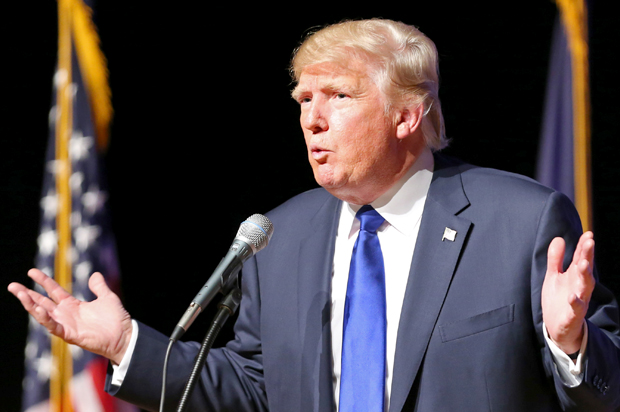A new Washington Post-ABC News poll proves what gut instinct was already telling you: The Donald Trump campaign’s success is built on the backs of racists. Or, if you prefer a gentler word that captures the immigrant-specific questions the poll asked, xenophobes. Either way, fear of foreigners coming to America to white people isn’t just driving the rhetoric of the Trump campaign, but it’s, quite predictably, shaping who his supporters are.
“Nearly half of GOP-leaning respondents in the poll — 47 percent — both support the deportation of undocumented immigrants and oppose accepting refugees from Syria and other Mideast conflicts,” the Washington Post reports. “If a GOP-leaning voter supports deportation, there is a 79 percent chance she or he also opposes Syrian refugees, compared with 54 percent if they oppose deportation.”
Call them the twofers: Republicans who both want to kick out all undocumented immigrants and stop Syrian refugees from entering. A whopping 51 percent of Trump’s supporters are twofers, compared to only 16 percent of all other Republican voters. “Put another way, pro-deportation/anti-refugee voters account for almost three-quarters of Trump’s support,” the Washington Post reports.
To be clear, nearly every Republican in the race has pandered to the twofers on some level, stoking hysteria about Syrian refugees and talking tough on immigration, even if they fall short of embracing Trump’s build-a-wall-kick-’em-out program. But Trump’s laser-like focus on these issues, along with a simple-minded belligerence that appeals to the bigoted (who are not known for their nuanced approach to issues) means he is killing with these voters. Enough to hold a comfortable lead as the primaries draw closer.
While these results aren’t surprising, there’s a couple of important lessons to be drawn from them. One, traditional coalition-building is collapsing in the Republican Party, which has become victim of its own propaganda machine. Two, this should (but won’t) put to bed any lingering hope that Trump is somehow going to say something too racist and lose his base of support.
To start with the second one, because it is the sexier issue: For months now, there’s been a sense in the pundit class that Trump is going to cross a line one day, saying something that will wake his supporters up to the fact that he’s not ready to win a general election, causing them to give up their love affair with the Orange One and move, however reluctantly, to a Marco Rubio or Jeb Bush. This assumption underestimates how enraged these voters are. These are people that often feel that they are losing their identity. This group is animated by the idea that white Christian conservatives are the dominant class by rights, and that any attempt to share power is capitulation. The Bushes and Rubios of the world are seen as squishes, people who think “conservatism” can somehow be separated from this white Christian identity.
As the poll shows, xenophobia is broadly popular in Republican circles, but clearly, it’s a priority issue for Trump supporters. People who are in such a panic state, believing their very identity is under threat by growing racial and ethnic diversity, aren’t going to be interested in people who they see as accepting change as inevitable (even if they promise to slow it down). They want to hear that it can be stopped, even reversed. And Trump is making that promise.
This entire situation is also a nice reminder that the politics of coalition-building, as frustrating and contentious as they can be at times, have benefits over the multi-decade conservative effort to use propaganda to create a singular, lockstep coalition. Democrats work by bringing people with different issues together, settling differences through compromise and often tedious amounts of discussion. For decades now, the right has gone a different route: Using talk radio, conservative publications and Fox News to create a singular conservative identity and persuading people in the coalition to adjust themselves to it.
There’s been a lot of political benefits to this, of course. For instance, it might seem like the churchy anti-abortion community would balk at slashing the social safety net on the grounds that it encourages abortion. But that doesn’t happen. Anti-choicers are conservatives first, and conservatives want to cut welfare and that’s that. To budge on this issue is to court accusations of liberalism, which cannot be countenanced.
Years of propaganda efforts have flattened out any differences of opinion on the right, creating a coalition that moves in lockstep. But the Trump candidacy shows the limits of that strategy. The xenophobic views are widely popular in the party, even if they aren’t priority number one for everyone. Once conservatives generally agree with each other, it becomes a competition to see who is the most ardent amongst them. That’s why, in recent years, we’ve seen a proliferation of the phrase “true conservative” in Republican circles. Having rejected the politics of coalition-building, conservatives just now want it to be a competition of who can be the most conservative conservative of all.
As long as immigration is a salient issue to conservatives, Trump is going to do well. He can convincingly portray himself as the most conservative on this issue, bringing a huge chunk of voters with him. The only way to combat that is to find some other enticing issue that a candidates is most conservative on, and distract voters with that. Carson was able to pull that off for awhile, but the immigration issue has surged to the front again because of the Paris attacks.
The Republican noise machine has been incredibly successful in building a powerful movement that moves in lockstep. But [insert your Frankenstein metaphor here]. There’s no real incentive for the Fox News and Rush Limbaughs of the world to dial it down. Lockstep conservatism is straight up good for ratings. But it increasingly looks bad for the Republican Party.

